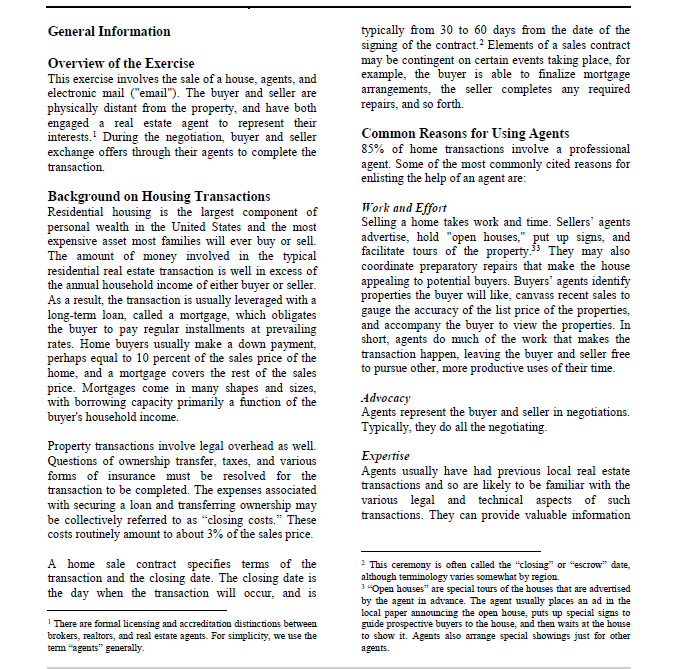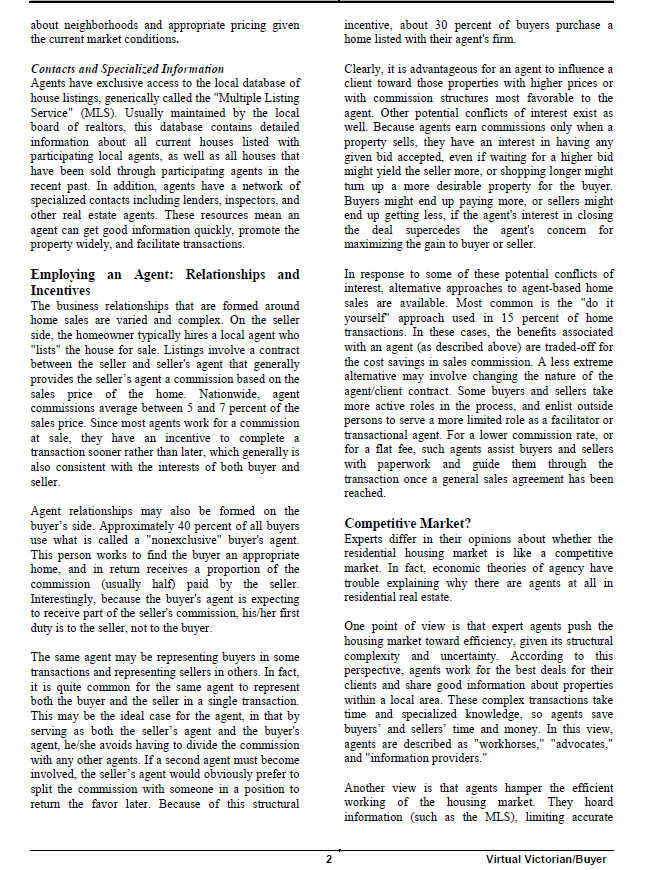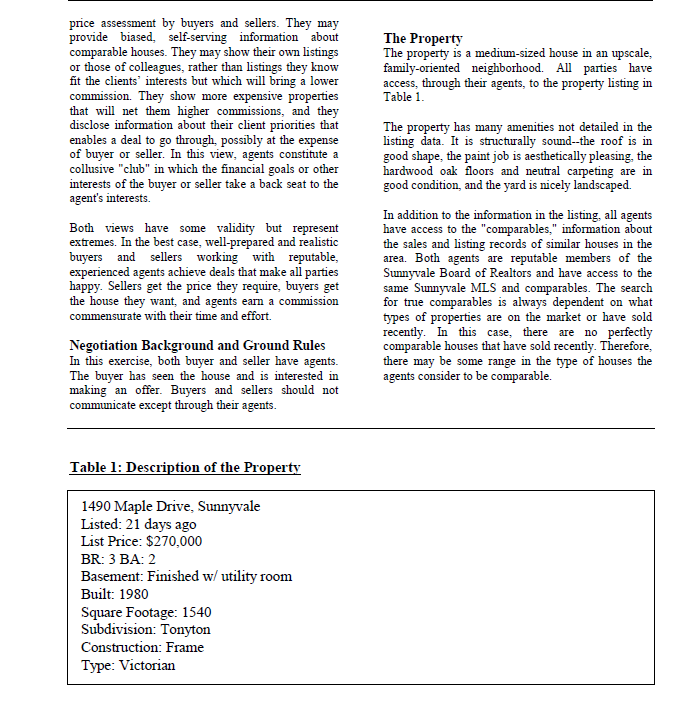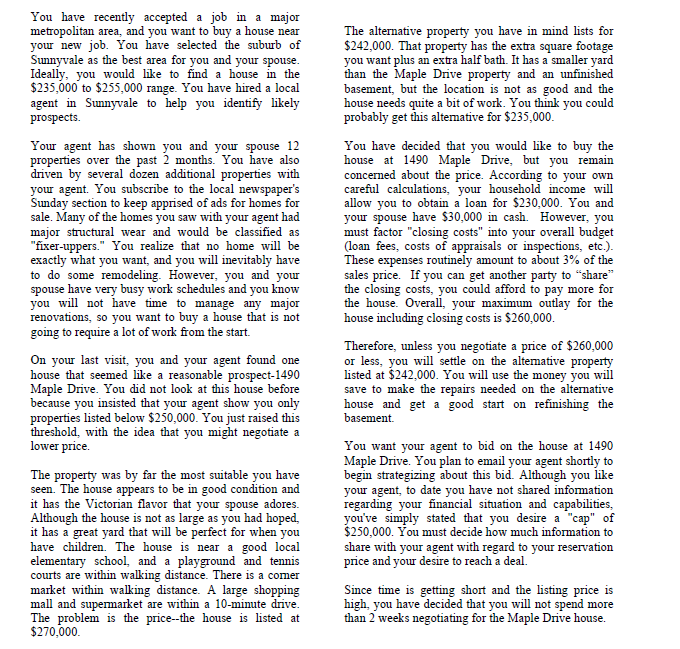




General Information Overview of the Exercise This exercise involves the sale of a house, agents, and electronic mail ("email"). The buyer and seller are physically distant from the property, and have both engaged a real estate agent to represent their interests. 1 During the negotiation, buyer and seller exchange offers through their agents to complete the transaction. Background on Housing Transactions Residential housing is the largest component of personal wealth in the United States and the most expensive asset most families will ever buy or sell. The amount of money involved in the typical residential real estate transaction is well in excess of the annual household income of either buyer or seller. As a result, the transaction is usually leveraged with a long-term loan, called a mortgage, which obligates the buyer to pay regular installments at prevailing rates. Home buyers usually make a down payment, perhaps equal to 10 percent of the sales price of the home, and a mortgage covers the rest of the sales price. Mortgages come in many shapes and sizes, with borrowing capacity primarily a function of the buyer's household income. Property transactions involve legal overhead as well. Questions of ownership transfer, taxes, and various forms of insurance must be resolved for the transaction to be completed. The expenses associated with securing a loan and transferring ownership may be collectively referred to as "closing costs." These costs routinely amount to about 3% of the sales price. A home sale contract specifies terms of the transaction and the closing date. The closing date is the day when the transaction will occur, and is 1 There are formal licensing and accreditation distinctions between brokers, realtors, and real estate agents. For simplicity, we use the term "agents" generally. typically from 30 to 60 days from the date of the signing of the contract. 2 Elements of a sales contract may be contingent on certain events taking place, for example, the buyer is able to finalize mortgage arrangements, the seller completes any required repairs, and so forth. Common Reasons for Using Agents 85% of home transactions involve a professional agent. Some of the most commonly cited reasons for enlisting the help of an agent are: Work and Effort Selling a home takes work and time. Sellers' agents advertise, hold "open houses," put up signs, and facilitate tours of the property. 33 They may also coordinate preparatory repairs that make the house appealing to potential buyers. Buyers' agents identify properties the buyer will like, canvass recent sales to gauge the accuracy of the list price of the properties, and accompany the buyer to view the properties. In short, agents do much of the work that makes the transaction happen, leaving the buyer and seller free to pursue other, more productive uses of their time. Advocacy Agents represent the buyer and seller in negotiations. Typically, they do all the negotiating. Expertise Agents usually have had previous local real estate transactions and so are likely to be familiar with the various legal and technical aspects of such transactions. They can provide valuable information 2 This ceremony is often called the "closing" or "escrow" date, although terminology varies somewhat by region. 3 "Open houses" are special tours of the houses that are advertised by the agent in advance. The agent usually places an ad in the local paper announcing the open house, puts up special signs to guide prospective buyers to the house, and then waits at the house to show it. Agents also arrange special showings just for other agents. price assessment by buyers and sellers. They may provide biased, self-serving information about comparable houses. They may show their own listings or those of colleagues, rather than listings they know fit the clients' interests but which will bring a lower commission. They show more expensive properties that will net them higher commissions, and they disclose information about their client priorities that enables a deal to go through, possibly at the expense of buyer or seller. In this view, agents constitute a collusive "club" in which the financial goals or other interests of the buyer or seller take a back seat to the agent's interests. Both views have some validity but represent extremes. In the best case, well-prepared and realistic buyers and sellers working with reputable, experienced agents achieve deals that make all parties happy. Sellers get the price they require, buyers get the house they want, and agents earn a commission commensurate with their time and effort. Negotiation Background and Ground Rules In this exercise, both buyer and seller have agents. The buyer has seen the house and is interested in making an offer. Buyers and sellers should not communicate except through their agents. The Property The property is a medium-sized house in an upscale, family-oriented neighborhood. All parties have access, through their agents, to the property listing in Table 1 . The property has many amenities not detailed in the listing data. It is structurally sound--the roof is in good shape, the paint job is aesthetically pleasing, the hardwood oak floors and neutral carpeting are in good condition, and the yard is nicely landscaped. In addition to the information in the listing, all agents have access to the "comparables," information about the sales and listing records of similar houses in the area. Both agents are reputable members of the Sunnyvale Board of Realtors and have access to the same Sunnyvale MLS and comparables. The search for true comparables is always dependent on what types of properties are on the market or have sold recently. In this case, there are no perfectly comparable houses that have sold recently. Therefore, there may be some range in the type of houses the agents consider to be comparable. Tahlo 1. Mocrvintion of the Dronovty (1) Issues to be negotiated; (2) Your position and interests on each of the negotiation issues; (3) The priority of each of negotiation issues; (4) Your BATNA and Reservation Point; (5) Your Target Point; (6) Your sources of power and negotiation strategies; (7) Your best estimate of your negotiation opponent's position, interests, BATNA, reservation point etc. Please be advised that the format of the planning document is flexible; it's for your use to get a better negotiation outcome. You have recently accepted a job in a major metropolitan area, and you want to buy a house near your new job. You have selected the suburb of Sunnyvale as the best area for you and your spouse. Ideally, you would like to find a house in the $235,000 to $255,000 range. You have hired a local agent in Sunnyvale to help you identify likely prospects. Your agent has shown you and your spouse 12 properties over the past 2 months. You have also driven by several dozen additional properties with your agent. You subscribe to the local newspaper's Sunday section to keep apprised of ads for homes for sale. Many of the homes you saw with your agent had major structural wear and would be classified as "fixer-uppers." You realize that no home will be exactly what you want, and you will inevitably have to do some remodeling. However, you and your spouse have very busy work schedules and you know you will not have time to manage any major renovations, so you want to buy a house that is not going to require a lot of work from the start. On your last visit, you and your agent found one house that seemed like a reasonable prospect- 1490 Maple Drive. You did not look at this house before because you insisted that your agent show you only properties listed below $250,000. You just raised this threshold, with the idea that you might negotiate a lower price. The property was by far the most suitable you have seen. The house appears to be in good condition and it has the Victorian flavor that your spouse adores. Although the house is not as large as you had hoped, it has a great yard that will be perfect for when you have children. The house is near a good local elementary school, and a playground and tennis courts are within walking distance. There is a comer market within walking distance. A large shopping mall and supermarket are within a 10-minute drive. The problem is the price--the house is listed at $270,000. The alternative property you have in mind lists for $242,000. That property has the extra square footage you want plus an extra half bath. It has a smaller yard than the Maple Drive property and an unfinished basement, but the location is not as good and the house needs quite a bit of work. You think you could probably get this altemative for $235,000. You have decided that you would like to buy the house at 1490 Maple Drive, but you remain concerned about the price. According to your own careful calculations, your household income will allow you to obtain a loan for $230,000. You and your spouse have $30,000 in cash. However, you must factor "closing costs" into your overall budget (loan fees, costs of appraisals or inspections, etc.). These expenses routinely amount to about 3% of the sales price. If you can get another party to "share" the closing costs, you could afford to pay more for the house. Overall, your maximum outlay for the house including closing costs is $260,000. Therefore, unless you negotiate a price of $260,000 or less, you will settle on the altemative property listed at $242,000. You will use the money you will save to make the repairs needed on the alternative house and get a good start on refinishing the basement. You want your agent to bid on the house at 1490 Maple Drive. You plan to email your agent shortly to begin strategizing about this bid. Although you like your agent, to date you have not shared information regarding your financial situation and capabilities, you've simply stated that you desire a "cap" of $250,000. You must decide how much information to share with your agent with regard to your reservation price and your desire to reach a deal. Since time is getting short and the listing price is high, you have decided that you will not spend more than 2 weeks negotiating for the Maple Drive house. about neighborhoods and appropriate pricing given the current market conditions. Contacts and Specialized Information Agents have exclusive access to the local database of house listings, generically called the "Multiple Listing Service" (MLS). Usually maintained by the local board of realtors, this database contains detailed information about all current houses listed with participating local agents, as well as all houses that have been sold through participating agents in the recent past. In addition, agents have a network of specialized contacts including lenders, inspectors, and other real estate agents. These resources mean an agent can get good information quickly, promote the property widely, and facilitate transactions. Employing an Agent: Relationships and Incentives The business relationships that are formed around home sales are varied and complex. On the seller side, the homeowner typically hires a local agent who "lists" the house for sale. Listings involve a contract between the seller and seller's agent that generally provides the seller's agent a commission based on the sales price of the home. Nationwide, agent commissions average between 5 and 7 percent of the sales price. Since most agents work for a commission at sale, they have an incentive to complete a transaction sooner rather than later, which generally is also consistent with the interests of both buyer and seller. Agent relationships may also be formed on the buyer's side. Approximately 40 percent of all buyers use what is called a "nonexclusive" buyer's agent. This person works to find the buyer an appropriate home, and in return receives a proportion of the commission (usually half) paid by the seller. Interestingly, because the buyer's agent is expecting to receive part of the seller's commission, his/her first duty is to the seller, not to the buyer. The same agent may be representing buyers in some transactions and representing sellers in others. In fact, it is quite common for the same agent to represent both the buyer and the seller in a single transaction. This may be the ideal case for the agent, in that by serving as both the seller's agent and the buyer's agent, he/she avoids having to divide the commission with any other agents. If a second agent must become involved, the seller's agent would obviously prefer to split the commission with someone in a position to return the favor later. Because of this structural incentive, about 30 percent of buyers purchase a home listed with their agent's firm. Clearly, it is advantageous for an agent to influence a client toward those properties with higher prices or with commission structures most favorable to the agent. Other potential conflicts of interest exist as well. Because agents earn commissions only when a property sells, they have an interest in having any given bid accepted, even if waiting for a higher bid might yield the seller more, or shopping longer might turn up a more desirable property for the buyer. Buyers might end up paying more, or sellers might end up getting less, if the agent's interest in closing the deal supercedes the agent's concern for maximizing the gain to buyer or seller. In response to some of these potential conflicts of interest, alternative approaches to agent-based home sales are available. Most common is the "do it yourself" approach used in 15 percent of home transactions. In these cases, the benefits associated with an agent (as described above) are traded-off for the cost savings in sales commission. A less extreme altemative may involve changing the nature of the agent/client contract. Some buyers and sellers take more active roles in the process, and enlist outside persons to serve a more limited role as a facilitator or transactional agent. For a lower commission rate, or for a flat fee, such agents assist buyers and sellers with paperwork and guide them through the transaction once a general sales agreement has been reached. Competitive Market? Experts differ in their opinions about whether the residential housing market is like a competitive market. In fact, economic theories of agency have trouble explaining why there are agents at all in residential real estate. One point of view is that expert agents push the housing market toward efficiency, given its structural complexity and uncertainty. According to this perspective, agents work for the best deals for their clients and share good information about properties within a local area. These complex transactions take time and specialized knowledge, so agents save buyers' and sellers' time and money. In this view, agents are described as "workhorses," "advocates," and "information providers." Another view is that agents hamper the efficient working of the housing market. They hoard information (such as the MLS), limiting accurate











